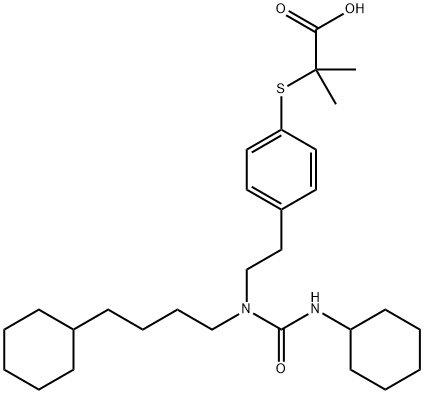GW7647 C??? ??, ??, ??
??
Peroxisome proliferator-
activated receptor-
α (PPARα) is a ligand-
activated transcription factor involved in the regulation of lipid homeostasis. Activation of PPARα results in expression of a variety of genes, particularly those involved in fatty acid β-
oxidation, binding, and transport. GW 7647 is a potent, selective agonist of human and murine PPARα It activates human PPARα, PPARγ, and PPARδ with EC
50 values of 0.006, 1.1 and 6.2 μM, respectively, in a GAL4-
PPAR binding assay. Similar EC
50 values of 0.001, 1.3, and 2.9 were observed with the murine receptors. GW 7647 lowered triglycerides 93% and 60% in fat-
fed hamsters and rats, respectively, at a dose of 3 mg/kg.
??
GW7647 has been used as a peroxisome proliferator-activated receptor α (PPAR α) ligand:
- in defatting medium to treat primary human hepatocytes
- to test its effect on the glycolytic function in cardiomyocytes
- to test its effect on infant mouse heart
- in breast cancer MDA-MB-231 cells to activate PPARs
??
ChEBI: A monocarboxylic acid that is 2-(phenylsulfanyl)isobutyric acid in which the phenyl group is substituted at the para- position by a 3-aza-7-cyclohexylhept-1-yl group in which the nitrogen is acylated by a (cyclohexylamino)carbonyl group.
?? ??
A cell-permeable urea-substituted thioisobutyric acid (ureido-TiBA) compound that acts as a potent and selective PPARα agonist (PPARα, γ and δ - EC
50 = 6 nM, 1.1 μM and 6.2 μM for human; 1 nM, 1.3 μM and 2.9 μM for murine, respectively). Also displays
in vivo lipid-lowering activity in rats.
???? ??
Potent and highly selective PPAR α agonist (EC 50 values are 6, 1100 and 6200 nM for human PPAR α , PPAR γ and PPAR δ receptors respectively). Modulates oleate metabolism and mitochondrial enzyme gene expression in mature myotubules in vitro . Has lipid-lowering effects following oral administration in vivo .
GW7647 ?? ?? ? ???
???
?? ??






